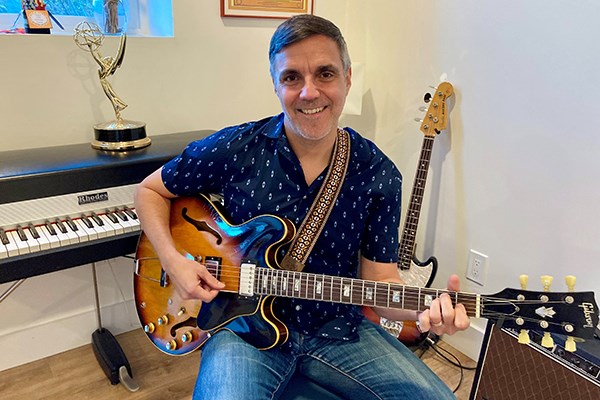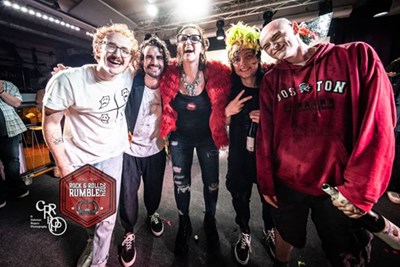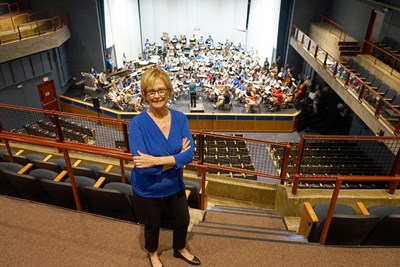Eric Casimiro ’96 and Greg Capolino ’00 Win for ‘60 Minutes’ Highlight Reel
 Image by Meredith Casimiro
Image by Meredith Casimiro
11/22/2024
By Katharine Webster
Two music and sound recording technology alumni won an Emmy award this year for a “60 Minutes” highlight reel they helped to create for CBS News.
More impressive, Eric Casimiro ’96 and Greg Capolino ‘00 were responsible for the audio on three of the five “sizzle reels” nominated this year for the Outstanding Promotional Announcement: News award.
Casimiro, who has been full time at CBS for 12 years, has worked on 14 videos that have received Emmy nominations and won twice, with his first coming for another “60 Minutes” highlight reel. Capolino has worked on four Emmy-nominated videos; this year’s award was his first.
Both men, now good friends as well as audio mixers and sound designers in CBS News’s marketing department, credit UMass Lowell’s Music Department and its Sound Recording Technology (SRT) Program with giving them the musical chops, studio skills and connections they needed to embark on successful careers.
“The job I have right now that just got me an Emmy, I got it because of someone I met freshman year,” Capolino says, referring to Casimiro, whom he met at a party. “And having gone through the SRT program was what got me callbacks to get internships. It gave me the connections, the internship and the self-confidence to go out into the world and give it a shot.”
 Image by Tony Crowe
Image by Tony Crowe
Casimiro says adjunct faculty members who were working SRT professionals were especially helpful and inspiring.
“They were making records,” he says. “I wanted to be in there with the bands making something that hadn’t been heard before.”
Casimiro and Cassettes
Casimiro says he’s especially grateful to adjunct faculty member David Moulton, who took students to his own studio, played music samples through two different sets of speaker cables and gave the students a blind test. Casimiro aced it because he had identified a subtle but distinctive sonic trait in one set of cables.
Moulton “pulled me aside before the next class and said, ‘You’ve got really good ears,’” Casimiro recalls.
Casimiro had begun training his ears early, recording himself singing and playing guitar on his parents’ cassette recorders. He layered sounds by playing one track on a boombox while accompanying it live and recording both on a second cassette player. Next, he graduated to a 4-track machine.
By the time he’d finished high school in New Bedford, Massachusetts, he loved sound engineering as much as he loved making music – and that made UMass Lowell’s SRT program a great fit.
Casimiro moved to New York City after finishing school and took any job he could find, beginning with an unpaid internship at a post-production studio, where he learned how to layer sound effects into videos for corporate clients.
Next, he worked as an audio engineer for various bands in Donald Fagen’s music studio until the Steely Dan singer, songwriter and keyboard player closed it to outsiders so the band could cut a reunion album there. By that time, Casimiro was reconsidering his goal of becoming a record producer, as he saw more senior engineers worn down by long hours, low pay and job uncertainty.
“I was living the dream, but I wanted to live the dream and make money,” he says.
So he began freelancing again, and he kept playing guitar, accompanying singer-songwriters all over the city.
“That’s what you have to do in New York: If you see any door ajar, you have to jump through it and diversify … because you don’t know where success is going to come from,” he says.
It came because of his musical prowess, which landed him a position as an audio engineer at a brand-new cable station, MSNBC. He enjoyed the work, but he left after winning a contest to whistle on the Boston-area band Guster’s first major album.
In the recording studio, the band learned he was a trained musician and sound engineer, and they invited him to spend the next year touring with them, including at Woodstock ‘99.
Afterward, he returned to television sound work in New York, where he freelanced for MTV, Comedy Central, NBC, VH1, BET, Sony Music and Oprah Winfrey.
When a group of his former co-workers at MSNBC moved over to CBS News, they persuaded the network to hire Casimiro as the division’s first-ever audio engineer. That gig became permanent after five years. And in 2021, as news coverage ramped up during the COVID-19 pandemic, he persuaded CBS to hire Capolino.
While he downplays his Emmys, Casimiro says that he and Capolino are the fastest and best in the business because of their strong musical backgrounds and the variety of jobs they’ve held.
“If you just go down one path, that might not be the path to success. But if you go down 12 paths, there’s more probability that something is going to work out for you, so don’t pigeonhole yourself,” he advises. “You’re just adding tools to the toolbox, and you never know what tools you’ll need.”
A ‘Guitar Hero’
Growing up in Somerville, Massachusetts, Capolino began playing guitar when he was 10 years old. From then on, he knew he wanted to work in music.
After graduating high school, he chose UMass Lowell over a well-known music conservatory because it was about one-third of the cost – and it was a university that offered a more diverse and robust campus life.
“I wanted the whole package,” he says.
After passing his guitar audition to be a music major, he joined the SRT program, drawn to the recording studio and the more technical aspects of how music and sound are made. After finishing school, he landed an internship at a local music recording studio.
Then, just as Casimiro had headed for New York, Capolino took off for Los Angeles, where he worked as a runner and assistant at a couple of major recording studios, working alongside such famed producers as Rick Rubin and Michael Beinhorn. He learned a lot, but brand-new digital audio software, including Pro Tools, began putting a lot of music studios out of business.
Capolino decided to pursue jobs in mastering and post-production instead, and his Hollywood cred got him an offer from a major post-production studio in Boston. Over the next five years, he learned mixing and sound design, and the owner let him use the studio after hours to play music with and record his singer-songwriter friends.
All that experience came in handy when Harmonix Music Systems, the company that invented the Guitar Hero and Rock Band series of video games, came knocking.
“That was a dream job,” he says. “I worked there for almost five years, remixing hundreds if not thousands of major label songs that went into Rock Band.”
When Rock Band’s popularity began to fade, Capolino jumped back into post-production work – including freelancing for Casimiro, whom he’d always admired.
“Whenever CBS called, it was like getting called up to the major leagues,” he says.
Casimiro and CBS called him up permanently in 2021. Now, the two work in tandem on all of the promotional videos for CBS’s news division, from “60 Minutes” to “CBS Mornings” and news specials.
“You don’t have to go to school to be an engineer, but for me, it just connected the dots and put me on the path,” Capolino says. “And now it’s two decades later, and I’m still on that path.”


